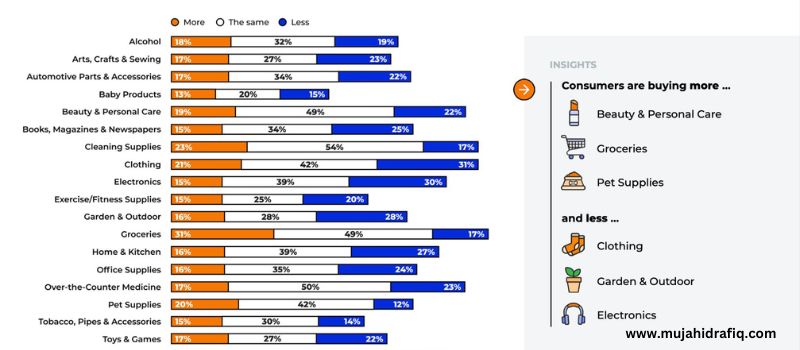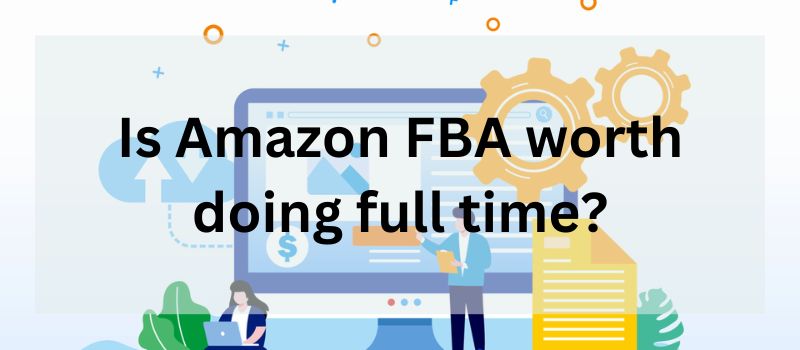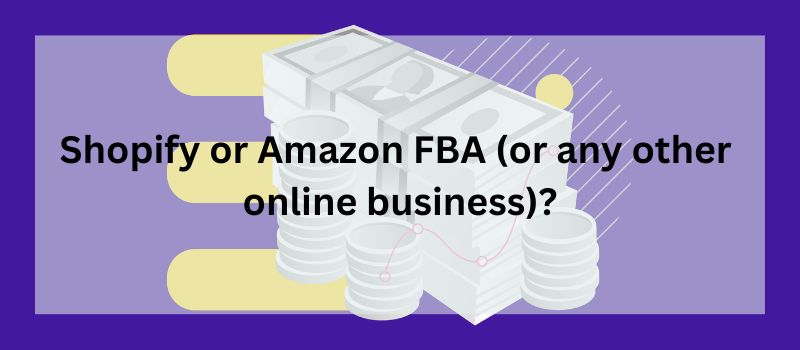If you currently have a full-time job but are interested in exploring an Amazon FBA selling side business, you’re probably wondering if it’s feasible to balance both. The idea of running an FBA brand while also committing 40+ hours per week to your day job definitely seems challenging.
But the truth is, thousands of Amazon FBA experts are doing just that: building successful FBA brands that generate an extra income stream for their families. With the right expectations and workflow in place, you can absolutely start an FBA business even with limited free time outside of your full-time job.
In this post, I, as an Amazon FBA expert, will share tips on Can I Start an Amazon FBA Business While Working Full-Time? You’ll learn strategies for
- Choosing The Right Products
- Managing Your Workload
- Setting Growth Goals
- Potentially Transitioning
into FBA full-time eventually.
Contents
- 1 Can I start an Amazon FBA business while working full-time?
- 2 Choosing the Right FBA Products to Sell
- 3 Managing Your FBA Business Around a Full-Time Job
- 4 Growing Your FBA Brand and Income Over Time
- 5 Outsourcing and Building a Team to Scale Up
- 6 FAQs:
- 6.1 Q1: Can I run my FBA business as a side hustle?
- 6.2 Q2: What income can I expect in my first year of FBA selling part-time?
- 6.3 Q3: At what sales volume should I go all in on FBA full-time?
- 6.4 Q4: How many hours per week should I budget for my side FBA business?
- 6.5 Q5: Should I hire a virtual assistant to help part-time?
- 6.6 Q6: What should I reinvest profits into?
- 7 Conclusion:
Can I start an Amazon FBA business while working full-time?
Absolutely! Many sellers launch lucrative FBA brands as side hustles along their 9 to 5s. With the right expectations set and workflow optimized, you can steadily grow profits over time. I’m happy to offer tips that helped me scale my own brand nights and weekends if helpful!
Choosing the Right FBA Products to Sell
Starting off with solid product selection is crucial when balancing FBA and a full-time job. You need products that are profitable, scalable for your brand, and relatively simple to source and ship initially.
What types of products are best suited for FBA sellers working full-time jobs?
Ideally, an Amazon FBA expert will want to focus on Amazon FBA wholesale virtual assistant private label products in their early stages. Private labeling involves sourcing generic products from manufacturers overseas, customizing them with your own branding and design, and selling them under your own listing on Amazon.
Some product categories that tend to work well for those building an FBA brand around a full-time job include:
- Kitchen storage and organization
- Home/office supplies and organization
- Toys and games
- Sports/outdoors equipment
- Personal care products like lotions or grooming tools
These categories often have manufacturers overseas that you can easily source from. The products also sell year-round at steady volumes, so you can more predictably estimate your sales and workload.

Tips for finding profitable and easy-to-source FBA products
When researching products, make sure to vet potential ideas for:
- Profitability – Use the Jungle Scout web app or other FBA product research tools to validate there is enough margin between wholesale unit costs and potential Amazon selling price. Shoot for at least $5+ net profit per unit.
- Existing competition – Having some existing listings is good, but avoid products with pages and pages of sellers. This usually signals low margins and heavy competition.
- Steady historical demand – Use tools like Jungle Scout, Helium 10, or Sonar to analyze a product’s monthly sales velocity over time. Spiky demand patterns suggest a fad product, while steady sales signal an evergreen item.
- Reasonable shipping costs/requirements – Bulky, heavy, dangerous, perishable or highly regulated products will be much harder to scale. Opt for lighter, smaller items that are easy to prep and ship yourself or through FBA.
Amazon fba expert by doing thorough product research before ordering your first inventory batch will set your FBA brand up for stability right from the start.
How to effectively do product research while having limited time
Here are some key tips for fitting thorough product research into a busy schedule:
- Start research in your downtime – Use pockets of free time during your work commute, lunch breaks, or evenings to browse related products in your niche and identify potential opportunities. Jot down ideas for further analysis when you have more time on weekends.
- Designate a Product Research Day – Block off 4-6 hours on a Saturday or Sunday solely focused on analyzing and filtering your shortlist using Jungle Scout or other tools. This helps amazon fba expert batch your research instead of spreading it out.
- Take advantage of analysis automation – Use features inside Helium 10 Cerebro or Jungle Scout’s Product Tracker to automatically populate data like BSR, sales estimates, dimensions etc to speed up the filtering process.
With some strategic planning, you can wrap up a majority of the product research phase within 2-3 weeks even while working full-time.

Managing Your FBA Business Around a Full-Time Job
Once you identify some winning products and place your first inventory order, the real work begins – managing your blossoming FBA business alongside your regular job.
Here are some best practices to effortlessly integrate your FBA workload into nights and weekends:
Best practices for balancing your FBA workload and your full-time job
- Adjust expectations upfront – Recognize you likely won’t have 20+ hours per week for your FBA brand – at least initially. Starting lean by selling just 1-2 products helps minimize your early workload. You can always add capacity down the road.
- Ruthlessly prioritize the most critical tasks – Don’t get bogged down doing lower-value activities. Focus on mission-critical processes first.
- Embrace automation tools as much as possible – From inventory prep and bookkeeping to customer follow-up, automate everything you can. This leaves only the essential strategic parts for you to handle manually.
- Create separate “work personas” for each job – Keep your mental headspace for each role separate by having dedicated work areas, computers etc for both jobs. Allow amazon fba expert to fully switch gears when transitioning between the two.
Key tools and services to help automate parts of your FBA business
Some of the best apps and platforms for automating routine seller tasks include:
- Inventory management & prep – Use Fetcher or Ecomsword prep and tracking services to simplify bundling multi-packs, labeling units, and shipping to Amazon FBA warehouses.
- Bookkeeping – An app like Quickbooks or Zoho Books can handle tracking income, expenses, inventory value, sales tax calculations, and cutting monthly profit checks all on autopilot.
- Email automation – Use services like Ecomdash or Feedback Genius to set up automatic order follow-up, reviews requests, win-back offers, and other customer emails.
- Advertising – Let Amazon’s internal advertising platform automatically optimize and bid for you within your budget ranges using auto campaigns.
Building up these parts of your assembly line early on alleviates tons of daily workload as your brand scales up.

How to structure your evenings/weekends to focus on highest-priority FBA tasks
Rather than tackling miscellaneous seller to-do’s whenever you have pockets of free time, take a more structured approach:
- Monday – Friday evenings: Replenish inventory by ordering from suppliers as needed. Handle 1-off customer issues. Review latest sales data and reports to inform upcoming weekend’s projects.
- Saturday: Dig into brand growth experiments – launch a new product, start a promotion, optimize listings for rank ascent during peak buying periods, brainstorm differentiation opportunities against top competitors.
- Sunday: Execute more analytical or creative brand building projects – craft next month’s content calendar, exploring new advertising methods, analyzing customer reviews and planning improvements to address feedback, fine-tuning your pricing mix across products.
Carving out set windows for defined types of activities prevents you from losing momentum or working in siloed fragments.
Growing Your FBA Brand and Income Over Time
During your first year, improperly setting expectations for growth and earnings is a common mistake for new part-time FBA sellers. Be patient, move strategically, and your brand can still compound nicely month to month.
Setting realistic first year sales goals as a part-time FBA seller
Aiming to generate an extra $3,000 – $5,000 in FBA earnings alongside your full-time income is very reasonable in year one selling 1-3 products.
Month-to-month, target adding roughly $250 – $500+ in incremental sales at nice margins. Reinvest a portion of profits back into inventory, product expansion, advertising, etc to spur this gradual linear growth.
While scoring viral success similar to overnight sensation brands is very rare, low seven figure valuations of FBA businesses typically take around 3+ years for most motivated sellers working full-time hours. Building to those levels in just evenings and weekends will understandably take closer to 5-7+ years. But stacking modest wins consistently moves you toward your end goal.
When to consider transitioning into FBA full-time from your current job
Rather than taking a risky leap all-in too prematurely, build solid stepping stones part-time first.
Hitting $25-30k in sales at excellent margins over a sustained 6-12 month period signals your FBA brand likely has enough momentum to support a full-time effort. Producing at those levels from just 10-15 hours per week of focus also demonstrates your workflow efficiency.
Use this revenue plateau as your cue to start planning a careful transition where you methodically scale back your day job hours while further accelerating FBA growth. Avoid an abrupt quitting and immediate all-in plunge before properly testing sustainability first while employed.
Tips for reinvesting profits to drive brand growth and income
Rather than siphoning off profits completely for personal use, strategically funnel a portion back into high ROI business growth initiatives:
- Hire freelancers to improve branding, product listings, or launch future products
- Test emerging ad platforms like Amazon DSP, Pinterest or TikTok
- Explore bundling products or complementary line extensions
- Attend industry trade shows to connect with suppliers and other Amazon sellers
- Upgrade tools & services subscriptions as your catalog expands
Analyze your P&L monthly and allocate leftover earnings into the areas generating the strongest return. This compounds overall sales and your bottom line.
Outsourcing and Building a Team to Scale Up
Handling every single FBA task solo will eventually overwhelm your capacity – especially if selling multiple products. Know when to start delegating and assembling an outsourced support squad.
Hiring a virtual assistant to help manage parts of your FBA workflow
Think through routine seller tasks that don’t require your specialized expertise. Customer service, placing reorders, resolving shipment issues and managing promos/giveaways are all great responsibilities to assign to a virtual assistant for amazon fba.
Reliable assistants can be hired affordably from freelancing sites like Upwork and Fiverrfor $5 – $15 per hour. Define your exact needs and vet candidates thoroughly through samples, video interviews etc before onboarding.
Bringing on brand ambassadors and influencers to grow awareness
Once you perfect internal operations and product quality, driving discovery and trial among new consumers is critical for elevating sales.
Rather than blindly paying for ads, identify relevant bloggers, YouTubers and social media influencers with engaged audiences highly interested in your niche. Pay them or trade product for organic featuring, reviews, unboxings or tutorials spotlighting your brand. Garnering authentic endorsements and prime positioning organically before competitors tap those channels will rock your conversions.
Options for outsourcing fulfillment and customer service as sales increase
Order volume swells quickly once your products gain awareness. At some point, fulfilling everything in-house cuts into innovation time. Outsource preparedness to pros.
Fulfilled By Merchant services like ShipMonk or Deliverr can house inventory in their warehouses and handle receiving, packing and shipping orders on your behalf.
3PL programs with Amazon directly like Seller Fulfilled Prime meanwhile let you tap into faster Prime delivery without assuming fulfillment overhead. This frees up mental bandwidth.
Customer service can also be cost-effectively routed to offshore teams trained for ecommerce inquiries. That clears your slate to focus purely on high-level growth and improvement.
Starting lean by outsourcing selectively prevents admin bottlenecks later on.
FAQs:
Q1: Can I run my FBA business as a side hustle?
Yes, thousands grow successful FBA brands as a side hustle alongside full-time jobs by leveraging automation tools, focusing on high ROI activities, and scaling outsourcing selectively over time.
Q2: What income can I expect in my first year of FBA selling part-time?
Reasonable first year earnings goals are around $3,000 – $5,000+ along with your current income by focusing on 1-3 profitable products. Keep expectations realistic.
Q3: At what sales volume should I go all in on FBA full-time?
Hit at least $25-30k per month at great margins for 6+ months before considering leaving your job fully for FBA. This signals enough sustainability.
Q4: How many hours per week should I budget for my side FBA business?
Expect to spend roughly 10-15 side hours weekly when launching then make incremental capacity adjustments as you scale, outsource, and optimize.
Q5: Should I hire a virtual assistant to help part-time?
Yes, hiring remote assistants affordable on platforms like Upwork or Fiverr alleviates workload by assisting with rote tasks. Define needs clearly first.
Q6: What should I reinvest profits into?
Funnel a portion of earnings into advertising, product expansion, branding, and automation tools generating the highest ROI. This compounds overall sales.
I aimed to address common reader questions and concerns about maintaining a separate full-time career while launching an FBA business in one’s spare time. Please let me know if you need any clarification or have additional questions!
Conclusion:
Can I start an Amazon FBA business while working full-time? In this post we answer this question while discussing
- Choosing The Right Products
- Managing Your Workload
- Setting Growth Goals
- Potentially Transitioning
We as an amazon fba expert understand that Running an Amazon FBA business while working full-time is certainly challenging, but thousands of Amazon fba expert show it’s possible. By
- Selecting Evergreen Products Suited To Automation
- Ruthlessly Prioritizing Your Limited Hours
- Leveraging Tools Plus Outsourcers Strategically As You Scale
you can absolutely propel an FBA brand forward alongside your career. With the right expectations set, there’s no reason why you can’t steadily compound your income month to month.
Reinvest to spur growth, make incremental optimization gains over time, and there’s potential to even transition fully in the future once your finances smooth out. You don’t need to tackle this all today.
Take it step by step. But I as an amazon fba expert hope after reading this, you now have a blueprint for integrating an FBA business into your life gradually. You’ve got this!
Get My Free Amazon Seller Starter Kit!
Read More:



